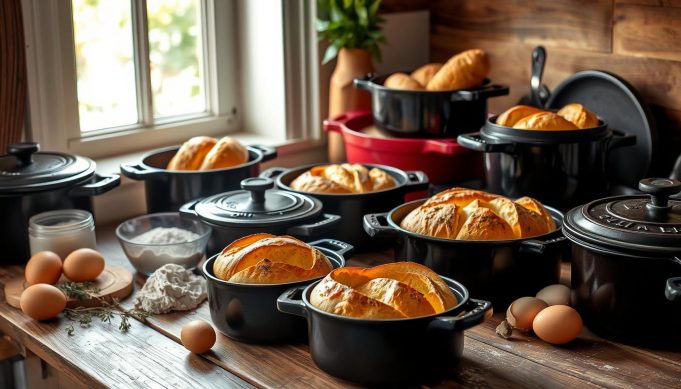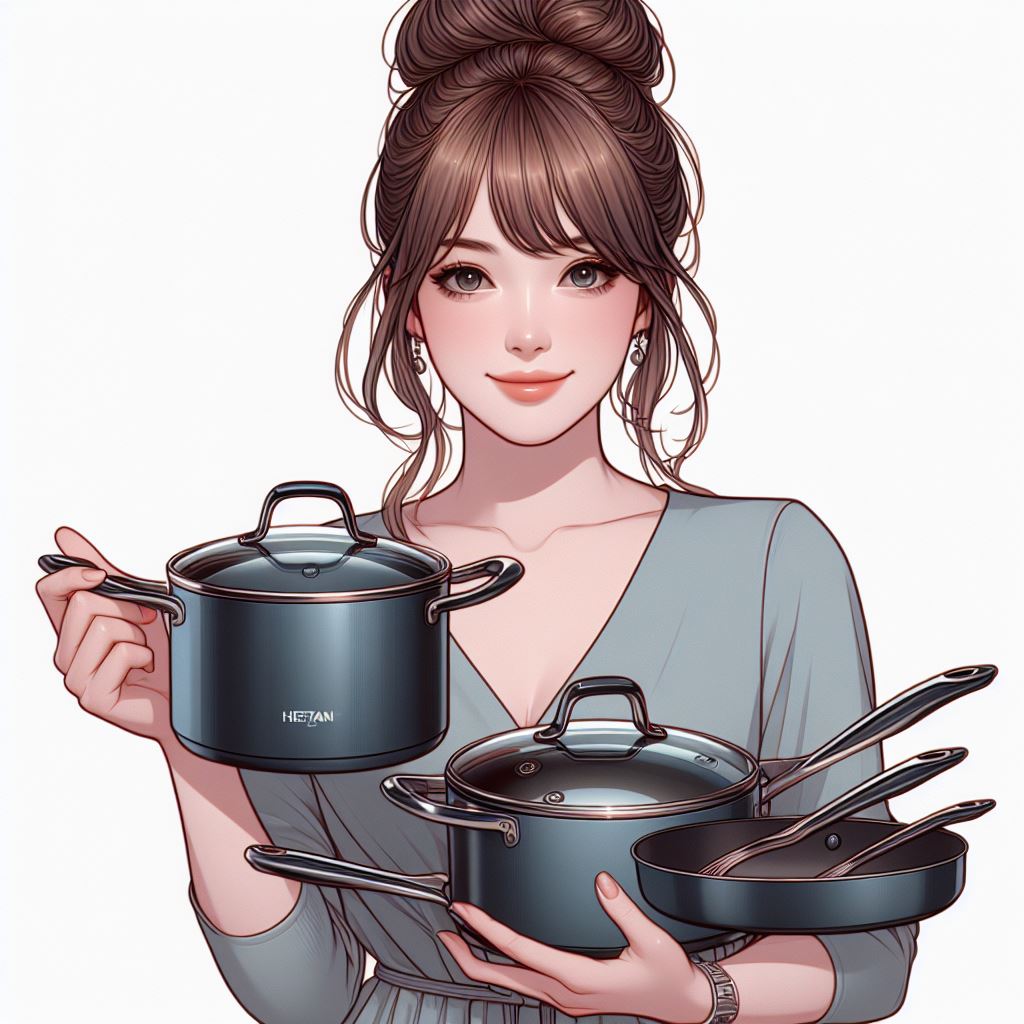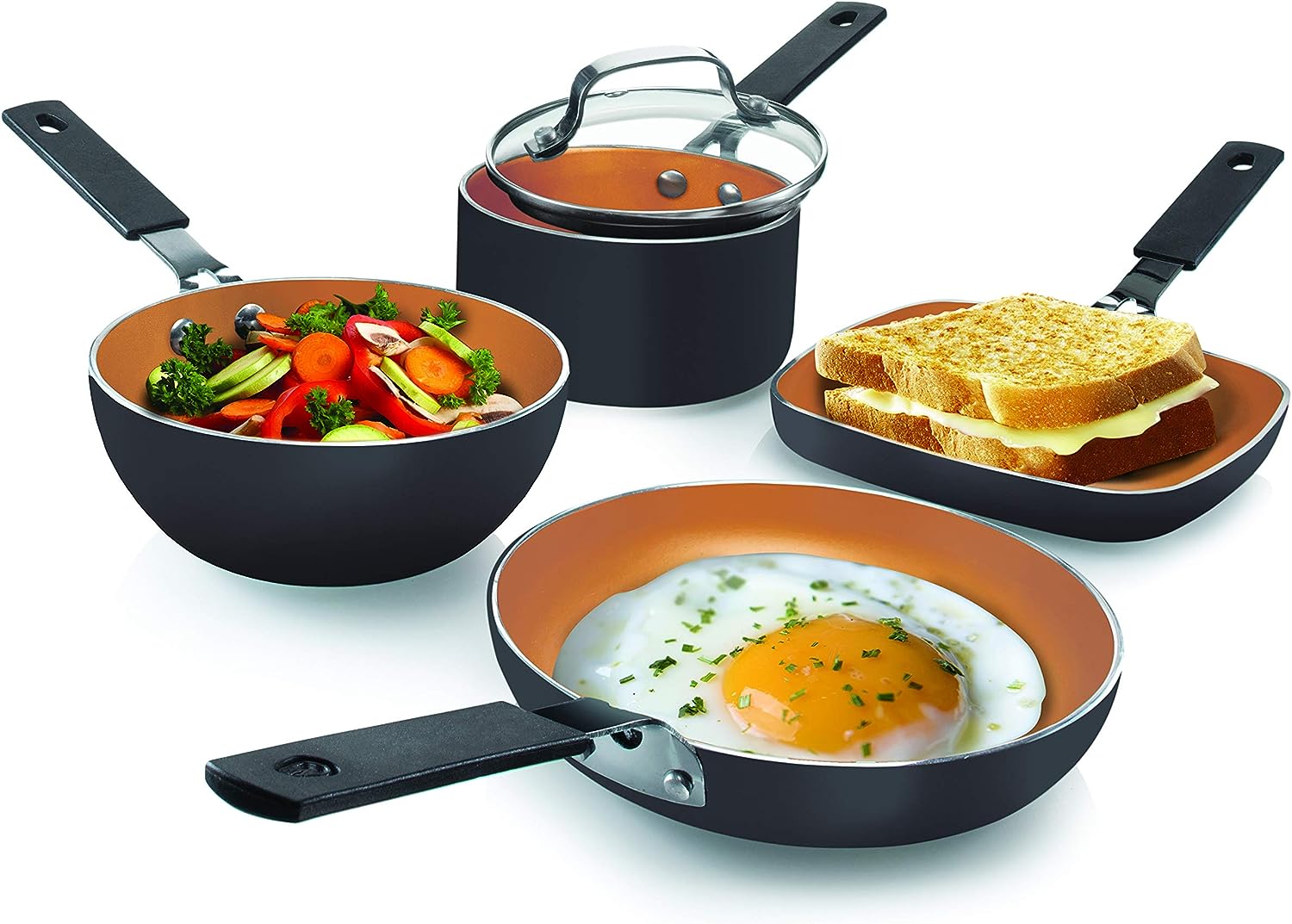Ever wondered why cast iron Dutch ovens are a top pick for bakers? They’re key for perfect crusts and even cooking. These ovens distribute heat well, making them a must-have for serious bakers1. They’re great for baking all sorts of dishes, from bread to desserts, and are a must-have in any kitchen2.
The right cookware can change your baking game, and cast iron Dutch ovens are no exception. Check out cast iron Dutch ovens for baking to see their benefits. They’re durable and versatile, making them a smart investment for any baker2.
Key Takeaways
- Cast iron Dutch ovens are ideal for baking due to their even heat distribution and retention1.
- They are a baking essential and can be used for a variety of dishes, from artisan bread to desserts1.
- Cast iron Dutch ovens are durable and versatile, making them a valuable addition to any kitchen2.
- They are a great example of oven-safe cookware and can be used for low and slow cooking2.
- By using a cast iron Dutch oven, you can achieve a perfectly baked loaf with a glossy crust1.
Introduction to Cast Iron Dutch Ovens for Baking
An enameled cast iron pot is great for baking. It’s durable and keeps heat well, perfect for a crispy crust3.
Cast iron distributes heat evenly, making it great for baking. With the right care, it will last for years and give you tasty results4.
Cast iron baking offers many benefits. You can get a crispy crust and cook many dishes easily. It’s a smart choice for any kitchen3.
Here are some key benefits of using an enameled cast iron pot for baking:
- Excellent heat retention and distribution
- Durable and long-lasting
- Versatile and can be used for a variety of dishes
- Ease of use and maintenance
Choosing an enameled cast iron pot will help you bake delicious treats easily. It’s versatile and keeps heat well, making it a must-have in your kitchen4.
| Size | Servings |
|---|---|
| 8-inch | 1-2 |
| 10-inch | 4-7 |
| 12-inch | 12-14 |
Choosing the Right Size Dutch Oven
When picking a Dutch oven, size matters a lot. A versatile Dutch oven is great for many cooking tasks. Think about how many people you’ll cook for and what dishes you’ll make. For instance, a 3-4 quart Dutch oven is perfect for one to three people5.
A high-quality cast iron Dutch oven is a smart choice for any kitchen. Think about the oven’s shape too. Round Dutch ovens are more common because they fit better on burners and heat evenly5. Your cooking pot should be big enough but not too big to handle.
Common Sizes and Their Uses
Dutch ovens come in sizes from 1/4 quart to 13 quarts. A 5-quart Dutch oven works well for most home cooking and is good for solo or small family cooks6. For bigger groups, you might need an 8-10 quart Dutch oven. Choose based on your oven size and cooking plans.
For more info on cookware, check out top cookware brands. They have great options for cooking pot for baking and more.
Factors to Consider When Buying
When buying a Dutch oven, look at material, size, and shape. A high-quality cast iron Dutch oven is durable and versatile. Think about the oven’s weight, how easy it is to handle, and the price. Dutch ovens can cost from $100 to over $5006.
The ideal Dutch oven size depends on your cooking needs. Consider your cooking style, the number of people you’ll cook for, and your oven size. With the right versatile Dutch oven, you can make many tasty dishes, from baked goods to braised meats.
| Dutch Oven Size | Recommended Use |
|---|---|
| 1/4 quart | Individual servings |
| 3-4 quart | Cooking for one to three people |
| 5-7 quart | Cooking for four to six people |
| 8-10 quart | Cooking for large gatherings |
Preparing Your Dutch Oven for Baking
To get the best baking results, you need to prepare your Dutch oven right. Seasoning it prevents rust and makes it non-stick7. A well-seasoned Dutch oven is key, and you should season it after every use and clean7.
Preheating your Dutch oven is also important for even cooking. Heat your oven to 450°F (230°C) with the Dutch oven inside for 30 to 45 minutes8. This ensures your loaf bakes perfectly, reaching an internal temperature of 206° to 208°F (96° to 97°C)8.
Using a Dutch oven can make baking better. It’s great for baking bread and desserts. To avoid burning, use parchment paper or corn meal to protect the dough8. This helps get a loaf with a beautiful golden crust.
For more on Dutch ovens and baking, check out this website. It shows the benefits of Dutch ovens for baking. With the right tools and techniques, you can make amazing baked goods that everyone will love.
By following these tips and using the right bakeware, you can become a great baker. Always season your cast iron and preheat your Dutch oven well for the best results7.
Recipes to Try in Your Cast Iron Dutch Oven
With your enameled cast iron pot, you can make many tasty dishes. You can bake, braise, and roast, trying out new recipes and techniques9. It’s a versatile and durable kitchen tool10.
Some popular recipe ideas include:
- Artisan bread, perfect for beginners9
- Hearty stews, such as beef or vegetable stew10
- Desserts, like cheesecake or brownies11
These recipes show how versatile your cast iron Dutch oven is. It’s great for both new and experienced cooks9. Your enameled cast iron pot ensures perfect results every time10.
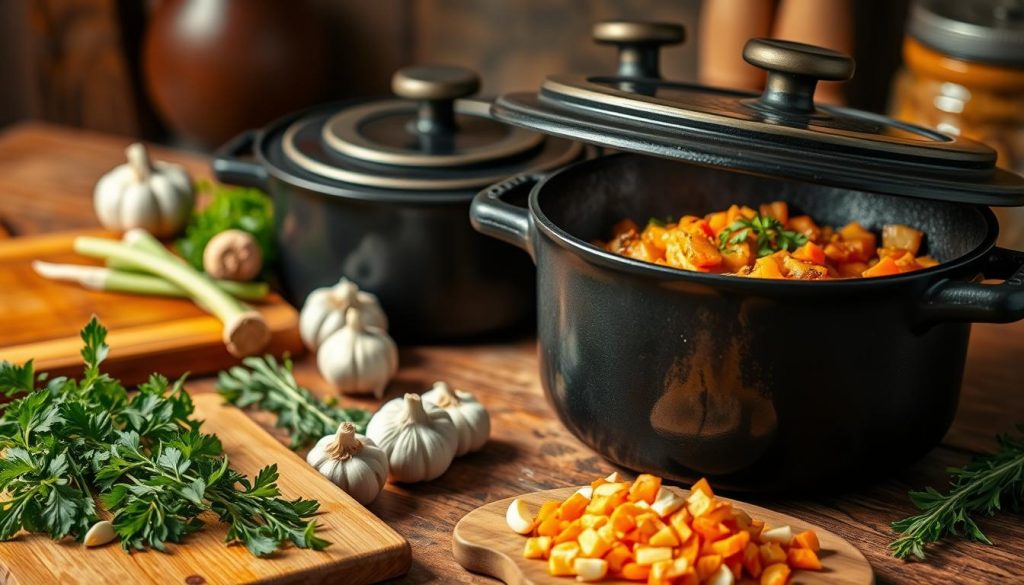
Your cast iron Dutch oven is perfect for slow-cooking. It keeps heat well and cooks evenly9. It’s also easy to clean and maintain, making it great for daily use10. So, why not try some new recipes in your multipurpose cooking vessel11?
| Recipe | Cooking Time | Servings |
|---|---|---|
| Artisan Bread | 30-40 minutes | 6-8 |
| Hearty Stew | 1-2 hours | 4-6 |
| Cheesecake | 45-60 minutes | 8-10 |
Baking Techniques Specific to Dutch Ovens
Using a versatile Dutch oven for baking requires special techniques. A high-quality cast iron Dutch oven is perfect for a crispy crust and a well-cooked inside. Start by preheating your cooking pot for baking to about 500°F (260°C) for the best results12.
Steam is a key part of baking in a Dutch oven. Covering the pot with a lid creates a steamy environment. This is great for baking no-knead bread, as it’s easy to do13. A pot size of 4 to 6 quarts is best for baking a round loaf12.
Here are some tips for baking in a Dutch oven:
* Preheat the pot to a high temperature before adding the dough.
* Use a small amount of water to create steam, which helps to cook the bread evenly.
* Cover the pot with a lid to trap the steam and heat.
* Bake for 15-20 minutes with the lid on, then remove it and continue baking for an additional 15-20 minutes14.
By following these techniques and using a high-quality cast iron Dutch oven, you can make professional-looking bread at home. Always use a versatile Dutch oven and a cooking pot for baking that can handle high temperatures12.
| Dutch Oven Size | Loaf Size | Baking Time |
|---|---|---|
| 4-6 quarts | 1-2 pounds | 30-40 minutes |
| 7 1/4 quarts | 1 1/2 pounds | 40-50 minutes |
Maintenance Tips for Your Cast Iron Dutch Oven
To keep your cast iron Dutch oven in top shape, proper cleaning and storage are key. Use mild soap and water to clean it, and dry it well to avoid rust. For stubborn stains, mix equal parts water and white vinegar, boil, then simmer for 10 minutes15.
When storing, apply a thin layer of vegetable oil to prevent rust. This method is recommended by about 90% of users16. Store it in a dry place, like a hook or hanging rack, to keep it off the ground and dry. This care can make your Dutch oven last up to 40% longer16.
By following these tips, your cast iron Dutch oven will stay in excellent condition. It will remain a trusted baking essential and oven-safe cookware for many years, ideal for artisanal bakeware.
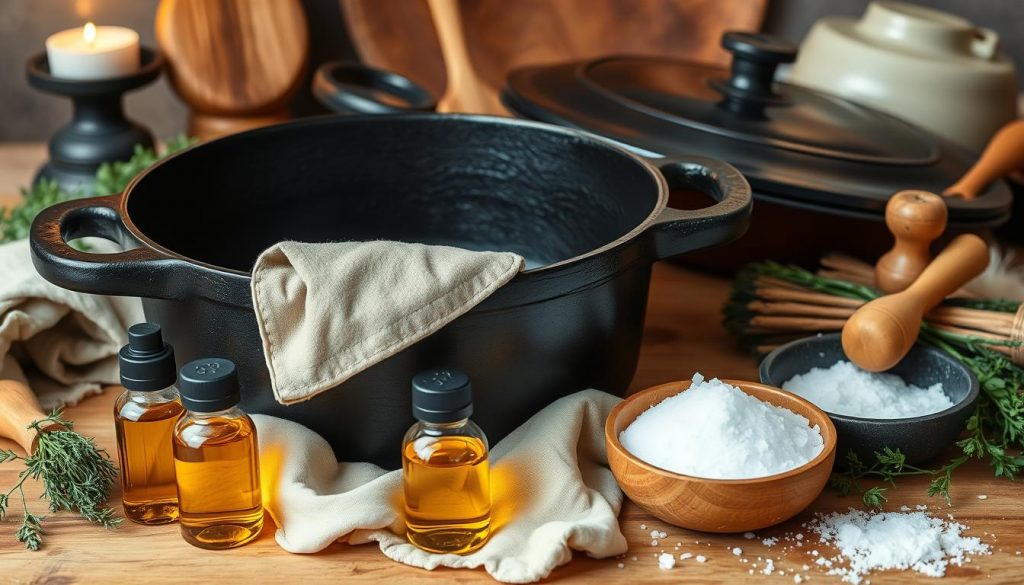
- Avoid using abrasive materials to clean your Dutch oven, as they can damage the seasoning16.
- Don’t put your Dutch oven in the dishwasher, as the high heat and harsh detergents can damage the seasoning16.
- Reseason your Dutch oven every 6 to 12 months to maintain its non-stick properties16.
By following these tips, your cast iron Dutch oven will stay in great condition. It will remain a valuable addition to your collection, making it a baking essential for years to come.
| Maintenance Task | Frequency | Importance |
|---|---|---|
| Cleaning | After each use | High |
| Storing | After cleaning and drying | High |
| Reseasoning | Every 6 to 12 months | Medium |
Troubleshooting Common Baking Issues
Using an enameled cast iron pot can sometimes lead to sticking batter or unevenly cooked bakes17. To avoid sticking, make sure the pot is hot and greased with oil or butter17. For the best results, bake on medium or low heat to prevent burning17.
If your bakes are too cooked or not enough, adjust the time and heat18. Preheat your cast iron or Dutch oven before adding dough for better baking18. Keeping your pot well-oiled after each use helps keep it seasoned and prevents rust18.
Here are some tips to help you:
- Use the right amount of oil or butter to prevent sticking17.
- Avoid using metal utensils on enameled surfaces to prevent scratches17.
- Don’t soak your Dutch oven in water for an extended period, as it can lead to rust19.
- For deep-frying, fill your Dutch oven with oil to one-third capacity to prevent splashing19.
By following these tips and using your enameled cast iron pot, multipurpose cooking vessel, or durable kitchen cookware correctly, you can troubleshoot common baking issues and achieve perfect bakes every time171819.
The Environmental Impact of Cast Iron Cookware
When picking cookware, think about its environmental effect. A versatile Dutch oven from high-quality cast iron is a green choice. Unlike non-stick skillets, which need replacing every 3 to 5 years, cast iron skillets can last for decades20.
Cast iron cookware is also a smart pick for baking. It’s safe for the oven, unlike non-stick skillets. Plus, iron in cast iron cookware can be recycled endlessly, saving energy20.
Choosing cast iron cookware has many benefits:
- It lasts for generations, cutting down on waste21.
- It works well on induction stovetops, saving energy21.
- Modern cast iron production is more eco-friendly than old methods21.
Opting for a versatile Dutch oven from high-quality cast iron helps the planet. It’s a cooking pot for baking that will serve you for many years.
Conclusion: Perfect Your Baking with Cast Iron
Baking with a cast iron Dutch oven is truly delightful22. Its ability to hold heat evenly makes it perfect for baking. Your breads, cakes, and desserts will always look great22. With the right care, your cast iron will be a key tool in your kitchen.
Don’t hesitate to try new things with cast iron baking23. Make fresh bread or enjoy rich cobblers and cakes. Each time you use it, your cast iron will get better and more unique22.
Cast iron cookware lasts a long time, even for generations23. Start enjoying the art of cast iron baking. It will become a special part of your home. Happy baking!
FAQ
What makes cast iron Dutch ovens unique for baking?
What are the benefits of using an enameled cast iron pot for baking?
What factors should I consider when choosing the right size Dutch oven for my baking needs?
How do I properly prepare my cast iron Dutch oven for baking?
What types of recipes can I make in a cast iron Dutch oven?
What baking techniques are unique to using a Dutch oven?
How do I properly maintain my cast iron Dutch oven?
What are some common issues that may arise when baking with a Dutch oven, and how can I troubleshoot them?
Why is choosing cast iron cookware a sustainable option for baking?
Source Links
- Bread baking in a Dutch oven – https://www.kingarthurbaking.com/blog/2017/02/21/bread-baking-dutch-oven
- What Is a Dutch Oven and When Should You Use It? – https://www.allrecipes.com/article/what-is-a-dutch-oven/
- PDF – https://stlbsa.org/wp-content/uploads/2018/02/Introduction-to-Dutch-Ovens.pdf
- Cast Iron Dutch Oven Basics – https://www.cheftalk.com/threads/cast-iron-dutch-oven-basics.113847/
- How to Choose the Right Dutch Oven for You – https://www.epicurious.com/expert-advice/what-size-dutch-oven-should-i-buy-article
- Which Size Dutch Oven Should You Buy? A Chef Weighs In – https://www.foodandwine.com/cooking-techniques/dutch-oven-sizes
- How to Season a Dutch Oven Simply and Quickly – https://unocasa.com/blogs/tips/how-to-season-a-dutch-oven
- How To Bake Bread in a Dutch Oven | The Perfect Loaf – https://www.theperfectloaf.com/how-to-bake-bread-in-a-dutch-oven/
- Easy Dutch Oven Recipes – https://temeculablogs.com/dutch-oven-recipes/
- 23 Dutch Oven Recipes That Make Delicious One-Pot Dinners – https://www.marthastewart.com/1014435/dutch-oven-recipes
- Dutch Oven Dessert Recipes – https://campfirefoodie.com/dutch-oven-dessert-recipes/
- Dutch Oven Bread 101 – Bake from Scratch – https://bakefromscratch.com/dutch-oven-bread-101/
- Baking Bread in a Dutch Oven – Artisan Bread in Five Minutes a Day – https://artisanbreadinfive.com/2009/03/11/baking-bread-in-a-dutch-oven/
- How to bake bread in a Dutch oven – Veg Patch Kitchen Cookery School – https://vegpatchkitchen.co.uk/using-a-dutch-oven/
- How to Restore and Season a Cast-Iron Dutch Oven – https://www.fieldandstream.com/gear/restore-and-season-your-dutch-oven
- How To Care For a Dutch Oven: The Complete Guide – https://www.marquettecastings.com/blogs/blog-2/how-to-care-for-a-dutch-oven
- 5 Mistakes to Avoid with Your Dutch Oven – https://www.thekitchn.com/dutch-oven-cooking-mistakes-253862
- Master Oven Baking with Cast Iron: Essential Tips for Perfect Results – https://www.castironmania.com/stream/cast-iron-in-the-oven/
- 10 Things You Shouldn’t Do With Your Dutch Oven – https://www.southernliving.com/food/kitchen-assistant/dutch-oven-mistakes?srsltid=AfmBOoqlKhGzD9x8chnfLdCEBvQs3boYog7hqEF4tMcNPvvdyji0i6ZN
- Why Cast Iron is the Non-Toxic, Eco-Friendly Option – https://fieldcompany.com/blogs/journal/why-cast-iron-is-the-eco-friendly-option?srsltid=AfmBOoqsYyvjBGpKGmtI7iuAJaTfpwCjHD_OeRadVb2mqjIDgkwAbJLt
- Reader Question: Is Cast Iron Truly Eco-Friendly? – https://www.leafscore.com/eco-friendly-kitchen-products/cast-iron-green/
- Why Cast Iron Cookware is the Go-To for Baking and Roasting – PotsandPans India – https://www.potsandpans.in/blogs/articles/why-cast-iron-cookware-is-the-go-to-for-baking-and-roasting?srsltid=AfmBOoqaAX_pkgB1WIBdxrfgjuYmIQLU4tl_9M0MX4ZNj0FoEQgcbsfG
- Why I Love Cast Iron for Cooking – https://www.almanac.com/cast-iron-cooking


